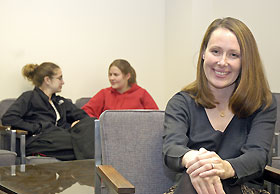For more archives, go to the Advance Archive/Search Page.
Research Finds Healthy Friendships
Smooth Kids’ Transitions
Having healthy friendships can play a key role in shaping the lives of children, particularly those who are at risk, says Julie Wargo Aikins, an assistant professor of psychology.
Wargo Aikins, who joined the UConn faculty this fall, has been studying how peer relationships affect children since she was an undergraduate.
 |
Julie Wargo Aikins, an assistant professor of psychology, does research on adolescents’ choice of friends. In the background, Michelle Dean, a junior, left, chats with Jessica Zager, a sophomore. |
“Children who are at risk of developing problems in school and with parents and peers can be identified as early as kindergarten,” says Wargo Aikins, who has been involved in a large long-term study of at-risk children. Much of the work connected to the study has involved devising ways to prevent these problems from emerging, she adds.
“The interventions were designed, in part, to teach children social skills so they would make better friendships and find relationships with other children who didn’t have the same difficulties,” Wargo Aikins says. “Delinquent children often get involved with other delinquent children, and that exacerbates their problems.”
They also have problematic relationships with their parents, she says: “We know that children who have negative interactions with parents don’t develop the skills necessary to perform well in school and in the community, and develop negative interaction styles that they may carry into their other relationships.”
Wargo Aikins earned a bachelor’s degree from Duke University in 1993, and both her master’s degree in 1996 and Ph.D. in 1999 from Pennsylvania State University. She was also a postdoctoral fellow at the University of California, Los Angeles, and a postdoctoral associate at Yale.
As she continued her research on at-risk children in graduate school, Wargo Atkins became interested in exploring the ways in which peer relationships contribute to their positive adjustment.
“Adolescence is a time in which we think about peer relationships’ becoming more intimate and significant,” she says. “And that might be the time these peer relationships may actually compensate in some ways, or facilitate positive adjustment for kids.”
Wargo Aikins says positive peer relationships may change the way adolescents perceive themselves or think about interpersonal relationships.
“They may see that they can get along with their friends, teachers, and others, and how that contradicts the kind of relationship they have with their parents,” she says. “So they say, ‘I’m ok. It’s not about me. Maybe the difficult relationship I had with my parents is about what they bring to the relationship rather than necessarily about me.’”
One of Wargo Aikins’ recent studies focused on the transition children make from elementary to junior high school. “This can be a particularly difficult time for kids,” she says. “There has been a fair bit of research looking at the transition as a trouble spot. I wondered what facilitates positive adjustment.”
She examined how positive, high quality friendships influenced early adolescent girls’ and boys’ adjustment to junior high school. Transition adjustment was defined in terms of their post-transition friendship quality, emotional distress, and school adjustment.
Her findings suggest the importance of positive friendships in making a smoother transition to a new school.
“The quality of the friendships the children already had were linked with their post-transition friendship quality and school adjustment,” she says. “Again, we see that high quality friendships contribute to better outcomes for kids over time. The support you garner from that relationship is a potent factor when you’re entering a different school with new opportunities and challenges. That’s in addition to other factors, but it is one important theme that you can build upon.”
Wargo Aikins is also conducting research on the Best Buddies program, an intervention project designed by the Kennedy Foundation to facilitate better adjustment for children with mental retardation. The program matches people who are mentally retarded with high school peers. They spend time with each other, participating in social activities and sharing their lives.
“Nobody ever tested the outcomes associated with participation in the program,” Wargo Aikins says, “so we designed a study to test what kind of effect it has. We’re hoping to find that these relationships are having a positive impact on peoples’ lives.”

